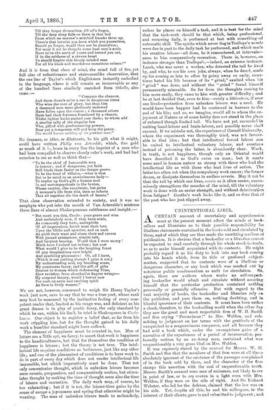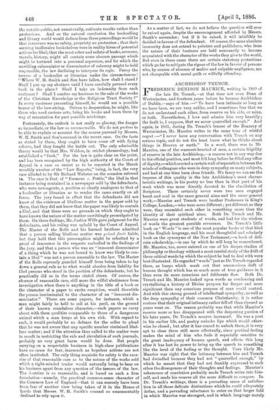UNINTENTIONAL LIBEL.
ACERTAIN amount of uncertainty and apprehension must at the present moment affect the minds of book- sellers and librarians as to their possible responsibility for
libellous statements contained in the books sold and circulated by them, and of which they are thus made the unwitting medium of publication. It is obvious that a bookseller or a librarian cannot be expected to read carefully through his whole stock-in-trade, so as to make himself acquainted with its contents. He might probably regard it as his duty to look into any book coming into his hands which, from its title or professed subject- matter, suggested that its contents were of a libellous • or dangerous character, or any book which was marked out' by notorious public condemnation as unfit for circulation. So, again, there are authors whose works no self-respect- ing bookseller would admit and circulate without assuring himself that the particular production contained nothing personally or generally offensive. But with regard to the vast majority of books, the bookseller and librarian rely on the publisher, and pass them on, nothing doubting, and in blissful ignorance of their contents. It must have been rather a shock, therefore, to the bookselling world when the other day they saw the great and most respectable firm of W. H. Smith and Son crying " Peccavimus !" to Mrs. Weldon, and sub- mitting to judgment on her terms with the gratitude of the vanquished to a magnanimous conqueror, and all because they had sold a book which, under the unsuspicious guise of a narrative of the experiences of a period of incarceration, pro- fessedly written by an ex-Army man, contained what was unquestionably a very gross libel on Mrs. Weldon.
It was expressly stated by the counsel for Messrs. W. 11. Smith and Son that the members of that firm were at all times absolutely ignorant of the existence of the passages complained of in the book sold by them, and the character of the firm stamps this assertion with the seal of unquestionable truth. Messrs. Smith's counsel were men of eminence, not likely to err in point of law, or to cry craven in a fight even with Mrs. Weldon, if they were on the side of right. And Sir Richard Webster, who led for the defence, claimed that the law was on his side. Yet, despite all this, he and his colleagues, in the interest of their clients, gave in and submitted to judgment ; and
the outside public, not unnaturally, estimate results rather than professions. And so the natural conclusion the bookselling and library world would deduce from these proceedings would be that innocence was no safety, propriety no protection ; that their seeming inoffensive bookshelves were in reality hives of potential actions for libel; that the most sober and sedate of books, sermons, travels, history, might all contain some obscure passage which might be tortured into a personal aspersion, and for which the unwilling calumniator or disseminator of calumny might be held responsible, the law declining to interpose its a3gis. Fancy the terrors of a bookseller or librarian under the circumstances ! "Where W. H. Smith and Son have fallen, how shall I stand ? Shall I put up my shutters until I have carefully perused every book in the place ? Shall I take an indemnity from each customer ? Shall I confine my business to the sale of the works of the Christian Knowledge or the Religious Tract Society ?" In every customer presenting himself, he would see a possible bearer of the bow-string. Driven to desperation, he might, like those who used curious arts, bring his books and burn them by way of recantation for past possible misdoings.
Fortunately, the outlook is not really so gloomy, the danger so immediate, or the law so unreasonable. We do not profess to be able to explain or account for the course pursued by Messrs. W. H. Smith and Son's counsel in the recent case. On the facts as stated by them, they ought to have come off with flying colours, had they fought the battle out. The only admissible theory would be that Mrs. Weldon, in cricket phraseology, had established a "funk." For the law is quite clear on the point, and has been recognised by the high authority of the Court of Appeal in a case so recent as to be reported in the March monthly number of the " Law Reports," being, in fact, the very case alluded to by Sir Richard Webster on the occasion referred to. The case is that of " Etnmens v. Pottle," the libel in that instance being contained in a newspaper sold by the defendants, who were newsagents, a position so clearly analogous to that of a bookseller or librarian as to render the cases exactly on all fours. The jury found in effect that the defendants did not know of the existence of libelous matter in the paper sold by them, that they did not know that the paper was likely to contain a libel, and that there were no grounds on which they ought to have known the nature of the matter unwittingly promulgated by them. On these findings, Mr. Justice Wills gave judgment for the defendants, and his ruling was upheld by the Court of Appeal. The Master of the Rolls and his learned brothers admitted that a person selling libellous matter was prima fade liable, but they held that this presumption might be rebutted by a proof of innocence in the respects embodied in the findings of the jury, and that a person who was an "innocent disseminator of a thing which he was not bound to know was likely to con- tain a libel " was not a person amenable to the law. The Master of the Rolls expressly guarded himself from being taken to lay down a general rule as to what would absolve from liability for libel persons who stood in the position of the defendants, but be practically did so in the terms stated above. Of course, the absence of reasonable care, still more the wilful abstinence from investigation when there is anything in the title of a book or the character of a paper to excite suspicion, would disentitle the person incriminated to the character of an "innocent dis- seminator." There are some papers, for instance, which a man might fairly be held to sell at his peril, on the ground of their known scandalous character,—such papers as carry about with them qualities comparable to those of a dangerous animal which a man keeps at his own risk. With regard to such, it would probably be no defence for the seller to plead that he was not aware that any specific number contained libel- lous matter; and if the attention thus called to the matter were to result in restricting the sale and circulation of such journals, probably no very great harm would be done. But people carrying on a respectable business in high-class publications have no cause for fear, inasmuch as hopeless actions are not often instituted. The only thing requisite for safety is the exer- cise of that reasonable care as to the nature of the works sold which a right-minded trader would naturally bring to bear on his business apart from any question of the terrors of the law. The doctrine is so reasonable, and is based on such a firm foundation—namely, the practical common-sense character of the Common Law of England—that it can scarcely have been from fear of another view being taken of it in the House of Lords that Messrs. W. H. Smith's counsel so unaccountably declined to rely upon it. As a matter of fact, we do not believe the question will ever be raised again, despite the encouragement afforded by Messrs. Smith's surrender ; but if it be raised, it will infallibly be decided in favour of the defendant. Of course, the same absolute immunity does not extend to printers and publishers, who from the nature of their business are held necessarily to become acquainted with the character of the works they give to the world. But even in these cases there are certain statutory protections . which go far to mitigate the rigour of the law in favour of persons who, by reason of absence of malice and culpable negligence, are not chargeable with moral guilt or wilfully offending.



































 Previous page
Previous page